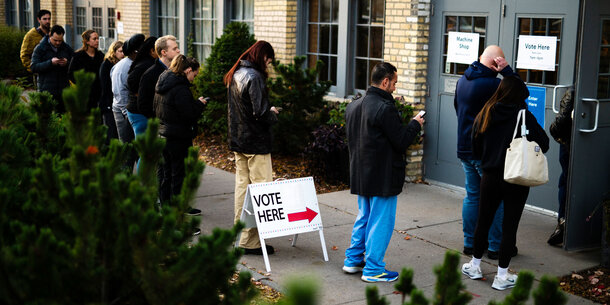On November 30, 2020, the Supreme Court will hear oral argument in Trump v. New York. The case concerns a challenge to President Trump’s “Exclusion Memorandum,” which attempts to remove undocumented immigrants from the state-population totals that the Census Bureau produces to reapportion seats in the U.S. House of Representatives among the states.
The Court has received over 25 friend-of-the-court briefs from an array of civil rights groups, current and former federal officials, state and local governments, scholars, businesses, and others.
To help sort through the filings, the Brennan Center has prepared this annotated guide summarizing each brief’s most prominent or unique points.
For more information on census-related litigation, visit our regularly updated case pages and calendar of upcoming hearings and deadlines. And for the latest on other challenges facing the 2020 Census, visit our census resource page.
Briefs Discussing the History of the Census and Apportionment
Census Historians and Social Scientists in Support of Appellees
Summary: This brief, filed by a group of prominent census historians and social scientists, explains that the census historically has been a measure of population, not political membership. As such, the brief continues, the population base used for apportionment has—for the entire history of the census—included all persons residing in the United States without regard to citizenship or immigration status. The brief additionally provides historical evidence that both the Framers and the drafters of the Fourteenth Amendment intended an inclusive apportionment base, and that later Congresses reaffirmed this principle by repeatedly rejecting as unconstitutional proposals to exclude noncitizen residents. The law firms Cravath, Swain, and Moore LLP and Haynes and Boone LLP are co-counsel on this brief.
Michael L. Rosin in Support of Appellees
Summary: This brief, filed by a scholar of congressional apportionment and the Electoral College, argues that the Thirty-Ninth Congress deliberately designed the Fourteenth Amendment to require an “inclusive” apportionment basis of all people, regardless of their citizenship status. The brief draws upon evidence relating to the drafting of both the Enumeration Clause, as amended by the Fourteenth Amendment, and the Penalty Clause. The law firm Stris & Maher LLP is counsel on this brief.
Ilya Somin and Sanford Levinson in Support of Appellees
Summary: This brief, filed by legal scholars, argues that the original meaning of the Census Clause required all persons to be enumerated for apportionment purposes. The brief additionally highlights that virtual representation of nonvoters—including noncitizens who reside in the United States—has always been a feature of the Constitution. The law firm Freshfields Bruckhaus Deringer US LLP is counsel for the brief.
Dr. John S. Baker, Jr. in Support of Appellants
Summary: This brief, filed by a law professor, contends that the original meaning of the Enumeration Clause and historical census practice do not support counting all people, regardless of their citizenship status, for apportionment purposes and that doing so violates the “one person, one vote” principle. Dr. John S. Baker and the Center for Constitutional Jurisprudence are co-counsel for this brief.
Briefs Discussing the Legal, Moral, and Practical Flaws of the Exclusion Memorandum
The National Congress of American Indians in Support of Appellees
Summary: This brief, filed by the National Congress of American Indians, explains that “Indians not taxed” are the only people the Constitution’s text excludes from apportionment, and undocumented people are not—nor are they analogous to—Indians not taxed. The brief additionally discusses the federal government’s historical attempts to deny Indians legal personhood and argues that the Trump administration’s attempt to deny undocumented people’s legal personhood is similarly unlawful and immoral. The Native American Rights Fund and the NCAI Fund are co-counsel for the brief.
LatinoJustice PRLDEF, et al. in Support of Appellees
Summary: This brief, filed on behalf of LatinoJustice PRLDEF and 12 Latino community organizations, argues that the Trump administration’s rationale for excluding undocumented residents from the apportionment count rests on a gross mischaracterization of their deep and enduring ties to the communities in which they live. The brief additionally discusses the Trump administration’s history of anti-immigrant policies and rhetoric, while arguing that the Exclusion Memorandum continues to harm both Latino communities and the broader communities of which they are a part. The law firm Clifford Chance LLP and LatinoJustice PRLDEF are co-counsel on this brief.
Local Governments in Support of Appellees
Summary: This brief—filed by local jurisdictions that collectively represent several million residents—argues that the Exclusion Memorandum’s determination that undocumented people are not “inhabitants” in a state is incompatible with their longstanding membership and participation in their communities. The Office of the County Counsel for the County of Santa Clara, CA, is co-counsel for this brief with attorneys for the Counties of Alameda, CA, Cook, IL, Cameron, TX, Dallas, TX, and Travis, TX; the Cities of Alameda, Oakland, Sacramento, Santa Cruz, and Santa Monica, CA; and the Los Angeles Unified School District.
NAACP Legal Defense and Educational Fund in Support of Appellees
Summary: This brief—filed by the NAACP Legal Defense and Educational Fund—explains that a key objective of the Fourteenth Amendment was ensuring that Black people had equal political representation after decades of the census counting enslaved Black people as less than full humans. It further explains that the Exclusion Memorandum is incompatible with this constitutional objective because it is a purposeful attempt by the Trump administration to limit the political representation of people of color, including Black people. NAACP LDF and the law firm Milbank LLP are co-counsel for this brief.
United States Conference of Catholic Bishops, et al. in Support of Appellees
Summary: This brief, filed on the behalf of several Catholic organizations, argues that the Exclusion Memorandum represents an unjust and illegal attempt to strip undocumented people of their legal personhood. The brief further discusses how the Memorandum will impede the Catholic Church’s ability to provide social services in poor and vulnerable communities, including by creating misallocations of federal funds for food assistance and public health programs. The law firm Harris, Wiltshire and Grannis LLP is counsel for this brief.
Briefs Discussing the Court’s Power to Hear and Decide the Case
City of San Jose, et al. in Support of Appellees
Summary: This brief, filed by the plaintiffs in a challenge to the Exclusion Memorandum in California federal court, draws upon recent rulings in related cases to demonstrate that the plaintiffs have standing to challenge the Memorandum. As the brief argues, the New York plaintiffs face a substantial risk of harm if the Trump administration implements the Memorandum, in the form of lost congressional seats and decreased federal funding. The brief further contends that the Court should not delay its review of the case until 2021 because that would create confusion for the congressional apportionment and complicate state-level redistricting. The law firm Latham and Watkins and the Lawyers’ Committee for Civil Rights Under Law are co-counsel for the brief.
The State of California, et al. in Support of Support of Appellees
Summary: This brief, filed by the plaintiffs in another California lawsuit challenging the Exclusion Memorandum, relies on evidence and rulings from their case to show that the Court has jurisdiction to hear this case and should resolve it prior to reapportionment in early 2021. The State of California Department of Justice is co-counsel for this brief along with attorneys for the California Citizens Redistricting Commission, County of Los Angeles, CA, the Cities of Long Beach, Los Angeles, and Oakland, CA, and the Los Angeles Unified School District.
Common Cause, et al. in Support of Appellees
Summary: This brief, filed by plaintiffs in a lawsuit challenging the Exclusion Memorandum in Washington, D.C., urges the Court to consider the rulings of all three federal courts that have already concluded that the Memorandum is unlawful. The brief particularly highlights the contributions that opinions in related cases make to the proper analysis of threshold issues in this case, such as ripeness and standing. The law firms Patterson Belknap Webb & Tyler LLP, Bondurant Mixson & Elmore LLP, and McDermott Will & Emery are co-counsel on this brief.
Eagle Forum Education and Legal Defense Fund in Support of Appellants
Summary: This brief, filed by the Eagle Forum Education and Legal Defense Fund, argues that the federal courts do not have jurisdiction to hear this case. Lawrence J. Joseph is counsel for this brief.
Briefs Discussing the Constitutional and Statutory Frameworks for Apportionment
United States House of Representatives in Support of Appellees
Summary: This brief, filed by the U.S. House of Representatives, explains how all three branches of the federal government have consistently understood the Constitution to require the enumeration of all persons for apportionment purposes and how Congress has implemented that understanding through federal statutory law. The Office of General Counsel for the U.S. House of Representatives, the Institute for Constitutional Advocacy and Protection, and the law firms Hogan Lovells US LLP and Debevoise & Plimpton, LLP are co-counsel for this brief.
Members of Congress in Support of Appellees
Summary: This brief, filed by twenty Democratic Senators, argues that the Framers of the Constitution established total population as the apportionment base in order to guarantee equal representation for equal numbers of people, and that the drafters of the Fourteenth Amendment reaffirmed this principle. Consequently, the brief asserts, the President cannot refuse to count people living in the United States simply because of their immigration status. The Constitutional Accountability Center is counsel for this brief.
Immigration Reform Law Institute in Support of Appellants
Summary: This brief, filed by the Immigration Reform Law Institute, contends that the Constitution permits the exclusion of undocumented residents from the apportionment base, since they are not members of our “national political community.” It further argues that excluding undocumented immigrants from apportionment protects equal representation. The Immigration Reform Law Institute is counsel for this brief.
Alabama in Support of Appellants
Summary: This brief, filed by the State of Alabama, claims that the Constitution requires excluding undocumented residents from the apportionment base because they are not “inhabitants” of the States, and as such, are not members of the political community entitled to political representation. It further argues that all prior apportionments that included undocumented immigrants violated the Constitution. The Office of the Alabama Attorney General is counsel for this brief.
Morris Jackson “Mo” Brooks, Jr., Bradley Byrne, and Robert Aderholt in Support of Appellants
Summary: This brief, filed by three congressmembers from Alabama, argues that the “one person, one vote” principle requires the President to exclude undocumented immigrants from the apportionment base, on the assumption that congressional districts must contain nearly equal numbers of citizens. Kobach Law LLC, the Office of U.S. Representative Brooks, and the Center for Constitutional Jurisprudence are co-counsel for this brief.
Briefs Discussing the Harmful Impacts of the Exclusion Memorandum
Dr. Andrew Reamer in Support of Appellees
Summary: This brief, filed by a leading researcher on the link between the census and federal funding formulas, argues that the Exclusion Memorandum’s directive to change the apportionment tabulation may affect the allocation of funding under numerous statutes and negatively impact eleven states litigating this case. The law firm Robbins, Russell, Englert, Orseck, Untereiner & Sauber LLP is counsel for this brief.
Businesses and Business Organizations in Support of Appellees
Summary: This brief, filed by sixteen companies and business organizations from a variety of sectors, argues that the Exclusion Memorandum will impair businesses’ access to political representation and, by creating a malapportioned Congress, threaten their ability to meaningfully contribute to congressional discussions about economic policy. The brief also argues that the Memorandum, by politicizing the census, will reduce the quality of—and businesses’ confidence in—data corporations normally use for marketing, product development, and other decision-making. The law firm Gibson, Dunn & Crutcher LLP is counsel for this brief.
The National School Boards Association et al. in Support of Appellees
Summary: This brief, filed by six educational organizations, urges the Court to invalidate the Exclusion Memorandum in order to guard against future illegal attempts by Presidents to manipulate federal funding streams on which state and local educational agencies rely. The organizations further illustrate how the Memorandum’s role in chilling census participation threatens federal funding for educational institutions serving communities that include undocumented students. The National School Boards Association is counsel on this brief.
League of Women Voters of the United States, et al. in Support of Appellees
Summary: This brief, filed by the League of Women Voters of the United States and its California, Texas, and Florida affiliate chapters, argues that the loss of representation and funding that will occur when the Trump administration implements the Exclusion Memorandum will not be limited to undocumented people, but rather extend to the greater communities within which they live. The brief also notes the chilling effect that the Memorandum will have on participation in future censuses if the Court does not block it now. The law firm Pillsbury Winthrop Shaw Pittman LLP is counsel for the brief.
Briefs Providing Other Factual or Legal Context
Former Directors of the U.S. Census Bureau in Support of Appellees
Summary: This brief, filed by three former Directors of the U.S. Census Bureau who served under both Republican and Democratic administrations, explains that the Bureau has always understood the law as requiring it to count everyone for apportionment purposes, regardless of immigration status. The brief further shows how the Exclusion Memorandum’s directive to remove undocumented people deviates from proper statistical practice. The Directors warn that the President’s decision to execute the Memorandum would erode public trust and stakeholder confidence by casting the count ultimately as a standardless, partisan exercise. The law firm Reed Smith LLP is counsel for the brief.
Faith-Based and Immigrants’ Rights Organizations in Support of Appellees
Summary: This brief, filed by the organizational plaintiffs in Haitian-Americans United v. Trump and two other organizations, argues that the Department of Commerce lacks the statutory authority and expertise necessary to determine immigration status for purposes of excluding undocumented people from the count. As the brief explains, immigration status is mutable, frequently indeterminate, and subject to revision by the federal government itself. Allowing Presidents to exclude people on the basis of their citizenship status, the brief concludes, thus exposes the census and the broader democratic process to political gamesmanship that the census was designed to avoid. The law firm Nutter, McClennen, and Fish LLP and Lawyers for Civil Rights are co-counsel for the brief.
Louisiana and Eight Other States in Support of Appellants
Summary: This brief, filed by nine states, argues that neither the Constitution, nor federal statutory law prohibits the President from excluding undocumented people from the apportionment. The brief further contends that excluding undocumented people from the count would serve federalism objectives by preventing states from winning additional political power in Congress by adopting sanctuary policies. The Louisiana Department of Justice is co-counsel for this brief, joined by the Attorney Generals of Arkansas, Kentucky, Mississippi, Missouri, Nebraska, South Carolina, South Dakota, and West Virginia.
Citizens United, Citizens United Foundation, and the Presidential Coalition, LLC in Support of Appellants
Summary: This brief—filed by Citizens United, Citizens United Foundation, and the Presidential Coalition—contends that the Constitution and federal law grant the President the authority to exclude undocumented immigrants from the apportionment base. It further argues that denying political representation to undocumented people residing in the United States will protect the nation from improper foreign influence. The law firm William J. Olson, PC and Citizens United are co-counsel for this brief.
Fair Lines America Foundation in Support of Neither Party
Summary: This brief, filed by Fair Lines America Foundation, argues that citizenship data is important for redistricting purposes, focusing specifically on the role such data could play in policy decisions about how to draw electoral districts. The law firms Josefiak Torchinsky PLLC and Dalton L. Oldham, LLC are co-counsel for this brief.




